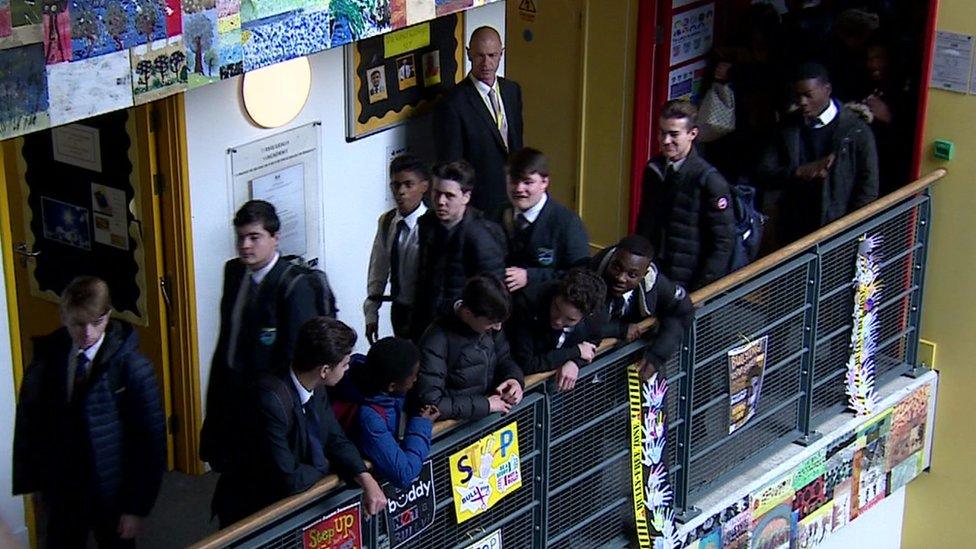Teaching fact from fiction
- Published
Filtering out fake and false information online. How difficult is it?
Nobody knows how big a problem fake news is, and many of those who talk about it have an incentive to inflate the threat.
As I've written before, for many people, fake news is a useful enemy. For Donald Trump, fake news is synonymous with a hostile media. By attacking the "fake news media", Trump can motivate his base, obstruct scrutiny of his policies, and potentially undermine his opponents.
For ambitious politicians keen to flaunt their digital knowledge and boost their profile, the fake news phenomenon is a handy option.
For digital firms keen to display a social conscience, fake news provides an opportunity to clarify their purpose - "we're technology companies, not media companies" - while showing that they do care, really, about democracy - even if their platforms are zones in which foreign autocrats interfere in domestic matters.
And for the mainstream media, which is suffering from a crisis of trust, seeing traditional business models turn into air, and completely failed to see the big stories of the past decade coming, the comparison with fake news is a way of making the case for professional journalists who go after the truth.
This is the context in which to see the BBC's plans to tackle fake and false news through a new initiative, in which online mentoring and school visits (including from me) promote better judgement about misinformation online.
It's the news, stupid
The big problem we face isn't fake news - it's the news, full stop. And that really is what the BBC's new initiative aims to sort.
The modern news system is in most ways exhilarating: available in your pocket, on phones that are the most convenient devices ever invented; constantly updated; and largely free. But it is also confusing, and some people have become adept at making false stories look plausible.
Yesterday I visited the impressive Leigh Academy in Dartford, where I spoke to Sixth Formers about how they consume media. Very few are on Twitter, which journalists are obsessed with; some are on Facebook, even if not so actively.
All are on Snapchat, for around three hours a day they said, which is remarkable when you think about it. For them, the camera is a way of talking: that's the insight that has made Evan Spiegel's app such a powerful force.

BBC News has announced it is to work with schools such as The Leigh Academy to tackle fake and false news
These teenagers in Kent have a highly developed sense both of the existence of fake news, and of the means by which various agents of misinformation try to spread falsehood online.
But the main thing I took from them was just how socialised their news consumption is. Naturally they don't read newspapers in print form, and consume virtually all their information on mobiles, which they are generally looking at within 10 seconds of waking up. The idea of journalists editing the world and curating a selection of stories, and maybe even bundling them together in some way - in, say, a newspaper or TV bulletin - is totally alien to them.
Instead, these teenagers have their news chosen for them by friends on some social media platforms, or chosen by those lovely people at Snapchat, according to their social preferences. They snack on news throughout the day; or, if you like, occasionally dip into the permanent stream of information on their mobiles and feeds.
A three-pronged fightback
This is a fun and hyper-convenient way to consume the news, but it comes with attendant dangers. One is that if you only see what your friends are interested in, your worldview will become narrow, and is more likely to reinforce your prejudices rather than challenge them.
A second is that if, for political or commercial reasons, someone invents a lie and successfully imposes verisimilitude on it, young minds might come to hold false beliefs. To resist them requires knowledge (of the actual state of the world), intellectual tools (scrutiny to determine truth from falsehood), and courage (to call out liars).
This trinity, when combined, produces news literacy - and it is this, rather than fake news itself, that the BBC's new initiative is aiming to promote.
To the extent that it exists at all, fake news spikes around big news events, such as plebiscites that are too close to call. Such is the nature and volume of information online, that it is almost certainly impossible to eradicate fully.
Combating it requires an as yet unclear combination of action from governments, technology companies, and civil society more broadly.
It is within the last of these that this BBC initiative sits; and as the current trends in news accelerate, toward news that is more mobile, more social, and more partisan, I suspect the case for helping teenagers distinguish truth from falsehood will grow, even if - indeed especially if - believing there is such a thing as the truth becomes ever less fashionable.